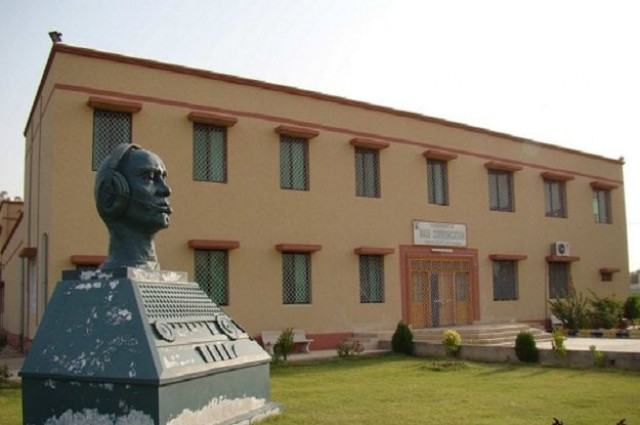Judicial inquiry says condition of SU hostel worse than jail
Biometric system to record entry and exit at the hostel recommended

PHOTO COURTESY: USINDH.EDU.PK
Referring to the inadequate system of maintaining entry and exit registers, unhygienic food, unclean water, improper lighting, harassment and other problems bedeviling the students living at the hostel, an interim report submitted in the Sindh High Court (SHC) on Thursday reads, "Under-trial prisoners residing in the barracks of jails are [living in a] better [condition] than students of the Sindh University". The interim report also contains a set of binding recommendations.
A Hyderabad district and sessions judge, Amjad Ali Bohyo, and judge Jahangir Ahmed Dayo of Jamshoro district are conducting an inquiry on the orders of the SHC. The final report will be taken up by the high court at the next hearing of the case of SU student Naila Rind's death, whose body was found hanging from the ceiling fan in her hostel room on January 1.
The police claimed that Rind committed suicide after being harassed by Anis Khaskheli, who was booked in the FIR of her death under sections 315, 316 and 509 of the Pakistan Penal Code (PPC), 6/7 of the Anti-Terrorism Act and Prevention of Electronic Crimes Act, 2016.
SHC order likely to end teacher-administration war at SU
"It seemed that there was neither time schedule for entry and exit ... nor rules and regulations," the interim report reads. Although two female staff members, both educated only till class eight, had been deputed for this duty, the entries were being made in the registers by the students themselves.
The Marvi Hostel consists of three blocks surrounded by thick bushes whose immediate removal has been ordered by the judges. The judges rated the condition of cleanliness as 'very poor'. Garbage was found lying inside and outside the rooms as well as around the premises. A lack of water supply in washrooms and toilets, unclean kitchen and unclean drinking water was also observed by the judges.
The inquiry also unearthed class segregation at the hostel, as it was found that poor students slept in the halls while those belonging to the middle or upper classes enjoyed rooms.
"It was also observed that there were about six students [staying] in one room and there were also complaints [by] students about their congestion [cramped condition]." Around 50 students were given beds in a hall in the hostel's Block A and another 38 in a hall in Block B.
The judges also found that no air conditioners were installed inside the hostel. The halls also lacked proper lighting arrangements. "[Students are living] in congested and suffocating conditions," the judges observed.
It was also discovered by the judges that filters in the water filtration machines in each of the three blocks of the hostel had not been changed for three years. When water samples from the hostel were collected and sent for the laboratory test, "the drinking water was found dirty".
Students also complained about expensive meals and the sale of expired food. Shops at the hostel were found to have not affixed the price list. The report observed that food items available at the hostel were unhygienic.
The report also accused the mess of providing substandard meals to the hostel residents, forcing students to cook their food themselves. The report observed that neither a doctor nor the varsity's administration bothered to check the food's quality on a regular basis.
During the visit, a student was found ill lying on a bed in the hall. Upon inquiry, the hostel's provost informed the judges that a female doctor at the hostel worked till 6pm. However, the judges found that the clinic was closed at 5:15pm.
The provost informed the judicial officials that she had requested the vice-chancellor to constitute an allotment committee comprising higher officials for the hostel rooms. But she could not produce the letter she claimed to have written in that regard.
The judges gave seven days to the SU registrar and the hostel's provost to submit an explanation for the hostel's condition.
Private universities: Government to decide on unaccredited programmes
Binding recommendations
The judges ordered installation of a biometric system to record the entry and exit of the hostel residents, closed-circuit television cameras and reverse osmosis plants. The varsity will also be required to fix a time after which female students will not be allowed to leave the hostel. The varsity will also ensure the regulation by imposing fines.
The report also directs the varsity to construct new rooms so that students sleeping in the two halls can be accommodated in the rooms. Installation of air conditioners inside the halls and repair work have also been ordered.
The judges also recommended implementing a particular uniform for all students and replacing the male sanitary workers and sweepers with female staff. Establishment of a guest room for parents and library inside the hostel was also recommended so that the students do not have to go to the SU's central library or one in the faculty office.
The SU registrar has been ordered to coordinate with the provost for the implementation of the recommendations.


















COMMENTS
Comments are moderated and generally will be posted if they are on-topic and not abusive.
For more information, please see our Comments FAQ